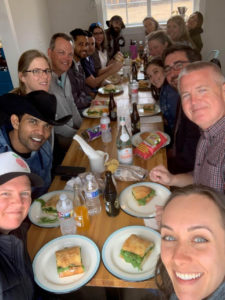By Mary Mik, ASU Food Systems graduate student.
Relocating for a Dream
Joe and Emily relocated to Arizona three years ago from California. There, they spent 25-year working in bars, restaurants, and clubs. With their track record in hospitality, desire to connect people with fresh food, and Emily’s green thumb, Joe and Emily imagined a new kind of work in their new home of Arizona.
The Evolution
Initially, the duo imagined opening an Airbnb and starting a farm that would provide fresh produce. While the Airbnb didn’t come to fruition, Joe and Emily started the farm in addition to an orchard. In both the farm and the orchard, they never lost sight of being stewards of the environment and caring for the soil. The couple started to practice raising their crops organically, seeing how “building great soil builds great food,” said Joe over a lunch of arugula, salsa verde, delicata squash, and whipped ricotta sandwiches and red leaf lettuce salad.
Joe and Emily started to sell their produce at their local farmer’s market. However, this alone didn’t pull in a sustained income. This inspired them to start baking and selling bread at the market. This, they say, became a hit. Seeing the success, Joe and Emily decided to combine their fresh produce, bread, and customers’ desires to eat fresh food and opened the Heidi Lane Café on December 12, 2019. When asked what inspired the café’s name, Emily admitted it’s not the name of a person—”it’s the name of our street, although a lot of people think my name is Heidi. I just go with it.”
Pivoting to Survive
Joe and Emily say the sudden global shutdown in March 2020 due to COVID-19 was “especially hard.” However, they believed sincerely in Heidi Lane’s potential. While the eatery’s doors were closed, inside bustled. The two prepared dried and canned goods from farm produce and the orchard and supplied their customers with takeout options. These efforts sustained them until they were able to reopen once again.
The Challenges Ahead
Today, Joe and Emily are still Heidi Lane’s sole two employees. While they love their work and are grateful that Heidi Lane withstood a nationwide shutdown, they express some remaining hurdles. First, they want to use farm-fresh eggs in their recipes but can’t unless purchased from what Emily states as “approved sources.” This takes away from their goal of providing the absolute freshest meals possible.
Second, Heidi Lane’s location does not see heavy customer traffic. On the side of busy SR-89 South, Joe wonders why the red-painted restaurant doesn’t stand out. He even put out a flag in the front lawn that said “open” at one point, but he still didn’t see a significant increase in traffic. Joe and Emily still ponder on how to increase customer turnout.
Third, they wonder about the most effective ways to market Heidi Lane. Joe and Emily say most traffic is through word of mouth. They have Instagram and Facebook pages and, with this, envision the restaurant to have a great reach. They remain hopeful their online presence will result in more customers.
Looking Up
Despite the challenges, Joe and Emily are optimistic about providing a quality experience for the community they serve. Heidi Lane’s small physical footprint on the highway reflects Joe and Emily’s goal of creating a small carbon footprint through locally-sourced ingredients, following organic practices, and caring for the soil that provides them with the fruits of their labor.
This blog is part of a series from the December 2021 Arizona Immersive program of the Food Policy and Sustainability Leadership Graduate Certificate Program. Students virtually toured the state, meeting with farmers, ranchers, entrepreneurs, government staff and non-profit leaders.


